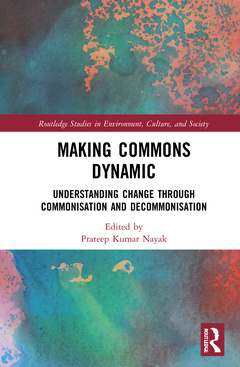Making Commons Dynamic Understanding Change Through Commonisation and Decommonisation Routledge Studies in Environment, Culture, and Society Series
Coordonnateur : Nayak Prateep Kumar

With an emphasis on the challenges of sustaining the commons across local to global scales, Making Commons Dynamic examines the empirical basis of theorising the concepts of commonisation and decommonisation as a way to understand commons as a process and offers analytical directions for policy and practice that can potentially help maintain commons as commons in the future.
Focusing on commonisation?decommonisation as an analytical framework useful to examine and respond to changes in the commons, the chapter contributions explore how natural resources are commonised and decommonised through the influence of multi-level internal and external drivers, and their implications for commons governance across disparate geographical and temporal contexts. It draws from a large number of geographically diverse empirical cases ? 20 countries in North, South, and Central America and South- and South-East Asia. They involve a wide range of commons ? related to fisheries, forests, grazing, wetlands, coastal-marine, rivers and dams, aquaculture, wildlife, tourism, groundwater, surface freshwater, mountains, small islands, social movements, and climate.
The book is a transdisciplinary endeavour with contributions by scholars from geography, history, sociology, anthropology, political studies, planning, human ecology, cultural and applied ecology, environmental and development studies, environmental science and technology, public policy, Indigenous/tribal studies, Latin American and Asian studies, and environmental change and governance, and authors representing the commons community, NGOs, and policy. Contributors include academics, community members, NGOs, practitioners, and policymakers. Therefore, commonisation?decommonisation lessons drawn from these chapters are well suited for contributing to the practice, policy, and theory of the commons, both locally and globally.
Part I: Introduction: Setting the Scene
1. Framing Commons as a Process: The Rudiments of Commonisation and Decommonisation
Part II: Roots of Decommonisation
2. The Dynamics and Performance of Marine Tourism Commons (MTC) in the Karimunjawa Island Marine National Park, Indonesia
3. The Cascading Effects of Coastal Commonisation and Decommonisation
4. Governing Fluvial Commons in Colonial Bihar: Alluvion and Diluvion Regulation and Decommonisation
Part III: What Enables Commonisation?
5. Five Key Characteristics that Drive Commonisation: Empirical Evidence from Sri Lankan Shrimp Aquaculture
6. Vicuña Conservation and the Reinvigoration of Indigenous Communities in the Andes
7. Commoning and Climate Justice
8. Understanding Groundwater Common-Pool Resources: Commonisation and Decommonisation of Cenotes in Yucatan, Mexico
Part IV: Commonisation and Decommonisation as Parallel Processes
9. Commoning and the Commons as More-Than-Resources: A Historical Perspective on Comcáac or Seri Fishing
10. Concurrent Processes of Commonisation and Decommonisation of Guadalquivir River (South Spain)
11. Creating a Commons for Global Climate Governance: Possibilities and Perils in the Paris Climate Agreement
12. Migration and the Commons: Recommonisation in Indigenous Mexico
13. Decommonisation–Commonisation Dynamics and Social Movements: Insights from a Meta-Analysis of Case Studies
14. Decommonisation and New-Commonisation of Mountain Commons in Northern Pakistan
Part V: Closing
15. Governance and the Process of (De)Commonisation
16. Commonisation–Decommonisation Perspective: Lessons for Practice, Policy and Theory
Prateep Kumar Nayak is Associate Professor and Associate Director of Graduate Studies in the School of Environment, Enterprise and Development, Faculty of Environment, University of Waterloo, Canada.
Date de parution : 09-2022
15.6x23.4 cm
Date de parution : 03-2021
15.6x23.4 cm
Thème de Making Commons Dynamic :
Mots-clés :
CPRs; SES; Commons; Shrimp Aquaculture; Decommonisation; UN; Commonisation; Commons Governance; Prateep Kumar Nayak; WSSV; Fikret Berkes; Shrimp Diseases; Patricia Dorn; Guadalquivir River; Simron J; Singh; Common Pool Resource Theory; Marine Tourism; Social Ecological Systems Framework; Indonesia; WSS; Pranab R; Choudhury; Paris Climate Agreement; North-East India; Global Climate Governance; Loktak Lake; Coastal Commons; Phumdi; Aquaculture Commonisation; Jeremy Pittman; Caribbean; Climate Change; Vipul Singh; Vicugna Vicugna; Bihar; Post Larvae; James MacLellan; Seri Cooperative; Evelyn Pinkerton; Shrimp Farmers; Eranga K; Galappaththi; Irrigation Communities; Sri Lanka; Fish Buyers; Gabriela Lichtenstein; Coral Reef Ecosystem; wildlife use; Coral Reef; South America; Subrata Singh; Water Governance; Patricia E; Perkins; climate justice; Yolanda Lopez-Maldonado; Yucatan; Mexico; Xavier Basurto; Alberto Mellado; Craig A; Johnson; global commons; James Robson; Sergio Villamayor; Gustavo Garcial; social movements; Shah R; Khan; C; Emdad Haque; Mountain commons; Resource management; Pakistan; Derek Armitage; Jessica Blythe
